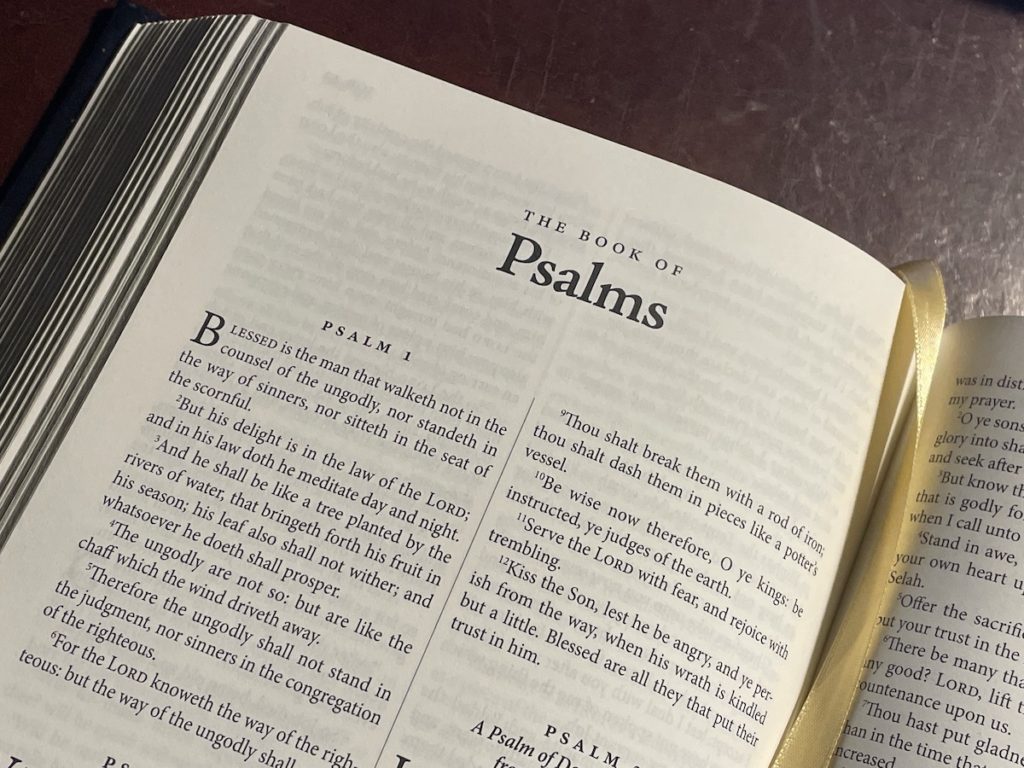Category Archives: Elohim/YHVH/The Godhead
Psalms 81 and 82 on New Moons and Small e Gods

Psalm 81
Psalm 81:3, Blow the trumpet [Heb. shofar] at the time of the New Moon [Heb. chodesh], at the full moon [Heb. keseh meaning full moon or concealed, covered — scholars disagree as to its meaning and the origin of the word], on our solemn feast day [Heb. chag] — NKJV. The ArtScroll Stone Edition Tanach translates this verse alternatively as follows,
Blow the shofar at the moon’s renewal, at the time appointed for our festive day.

The origins of the Hebrew word keseh behind the phrase “full moon” is uncertain and there is debate among the experts on this subject. Some Hebrew lexicons relate it to a Hebrew root word meaning “to conceal, to cover” (e.g., Gesenius; Strong’s number H3677 cp. H3678), while others tell us that it means “fullness; full moon” (e.g., Brown Driver Briggs Hebrew Lexicon; cp. The TWOT; Strong’s). BDB tells us that the origin of keseh is unknown and that it may be an Aramaic loan word meaning “full moon.” Gesenius in his lexicon states that the etymology of keseh isn’t clear, but he favors the idea of the moon being covered or concealed in darkness as opposed to being covered in light (i.e., in its full moon state).
The only other usage of keseh in the Scriptures is found in Prov 7:20, which gives us no clue as to the exact meaning of the word.
Orthodox Jewish scholars tell us that keseh means “to conceal or to cover.” They say that the only biblical festival that occurs at the time of the new moon (biblically, when the first sliver of the new moon becomes visible) is Yom Teruah (or Rosh HaShanah), which occurs on the first day of the seventh month (in late summer). At this time, the moon is nearly completely covered or concealed except for a small, visible sliver.

The next phrase in this verse speaks of a solemn feast day, which is the Hebrew word chag. This word refers to the three pilgrimage festivals, which are Passover and the Feast (or chag) of Unleavened, the Feast (or chag) of Weeks or Pentecost and the Feast (or chag) of Tabernacles (Exod 23:14–16; Deut 16:16).
Jewish scholars relate the word chag to Yom Teruah (which they say refers to Rosh HaShanah, see The ArtScroll Tanach Series Tehillim/Psalms Commentary on this verse). The problem with this interpretation is that the Scriptures never call the day of the new moon (rosh chodesh) a chag, nor is Yom Teruah technically a chag either in the strictest sense of the meaning of the word and its usage in Scripture. Therefore, the word keseh, if it means “concealment” must be referring to both the new moon day (the first day of each month, and to Yom Teruah, which occurs on the first day of the seventh month), while the chag must be referring to the three pilgrimage festivals.
Those scholars who take the word keseh to mean “full moon” say that the phrase in this verse containing this word refers to the pilgrimage festivals (Passover/Feast of Unleavened Bread, Feast of Weeks, and Feast of Tabernacles), which all occurred on or very near the time of the full moon.
Whichever interpretation you side with, the bottom line is this: The Scriptures command us to sound the shofar at the time of the New Moon, on Yom Teruah and during the three pilgrimage feasts. (See also Num 10:10.)
Psalm 82
Psalm 82:1, Elohim stands…the gods/Congregation of the mighty.Dr. Michael Heiser in his two books, Reversing Hermon and The Unseen Realm puts forth a convincing argument that the elohim mentioned in this verse are what Scripture refers to in many places as “the hosts of heaven” and refer to Elohim’s divine heavenly council. This same council is also referred to in Deut 33:2; 1 Kgs 22:19; 2 Chron 18:18; Job 15:8; Jer 23:18; Dan 7:9–10 and Heb 2:1; Acts 7:53.
“The congregation of the mighty” seems to be a reference to Elohim acting as the Supreme Judge among his divine, heavenly council that carries out his orders. This is more than the traditional “Godhead” (i.e., the Father, Son and Holy Spirit) and also includes angelic and spirit beings, and even Satan himself.
From time to time, Elohim gathers his council together as we see in Job (Job 1:6; 2:1). Even lying spirits are subject to and do the bidding of Elohim who presides over this council also referred to as the host of heaven (1 Kgs 22:19–23). Moreover, some of the “Us” passages in the Scriptures, which have typically been attributed to the “Godhead,” according to Heiser, likely refer to this divine counsel (e.g., Gen 11:7; Ezek 44:6). This has been the view of ancient Jewish sages as well.
Modern biblical theologians have traditionally taken a non-supernaturalistic view of Psalm 82:1 by saying that the gods here refer to human rulers. While elohim may by definition and biblical usage refer to human rulers, this passage cannot be limited to this definition alone, since verse seven refers to these gods or elohim as “dying like men” as a result of Elohim’s divine judgment on them because of their wickedness. This threat makes little or no sense if it is referring only to human rulers.
For the record, Yeshua quotes verse six in reference to human rulers (John 10:34; 14:30; 16:11), so this passage should not be taken to refer only to Elohim’s divine counsel or just to human rulers, but probably to both. This is because behind human rulers are evil spirits or principalities that govern the nations (Dan 10:20; Eph 6:12; Rev 13:2) and all of these are under the aegis of Satan, who has his own kingdom (Matt 12:26) and is presently the ruler of this world (John 12:31); however, even Satan’s kingdom is under the ultimate authority of YHVH Elohim.
The idea that there were and are unseen evil spirits and demi-gods that rule the nations of the world behind the scenes is revealed in the book of First Enoch and is also found in traditional ancient Mesopotamian historical accounts and forms the basis for the ancient Greek mythos, as Heiser proves.
Additionally, we learn from Genesis chapter ten (in the Table of the Nations) that, at that time, there were seventy nations of the world that rebelled against YHVH at the Tower of Babel (Gen 11). Interestingly, and a little later, Jacob had 70 descendants who went down to Egypt (Exod 1:5) and who become the children of Israel. From them, Moses chose 70 elders to rule over Israel (Exod 24:1), which would eventually became the Great Sanhedrin that ruled the Jewish people. YHVH then commissioned Israel to evangelize the apostate nations by being a spiritual light to them (Deut 4:5–8)—a task they utterly failed to perform. Picking up where ancient Israel failed in its mission, Yeshua chose 70 disciples not only to replace the Jewish Sanhedrin in spiritual authority over the people of Elohim, but to go forth and to preach the gospel to the 70 nations (Luke 10:1–12, 17; Acts 1:8 cp. Matt 28:18–20) that had been lost to the kingdom of Satan at the Tower of Babel, thereby to reclaim the world for the kingdom of Elohim at the devil’s expense.
Eventually, and hopefully in the not too distant future, the resurrected and glorified saints, who will become the sons of Elohim and will be adopted into his divine family as small E elohim (John 1:12; 1 John 3:1; Gal 3:26; Rom 8:14; Eph 1:5), will rule and reign with Elohim (capital E Elohim, Rev 1:6; 5:10; 20:6) over the new heavens and new earth. This will all be to Satan and his kingdom’s detriment and to that of the small E elohim human rulers of his present-day earthly kingdom, all of whom will be cast into the lake of fire at the end of the age (Rev 20:10).
Psalm 82:6, You are gods…children of the Most High.This statement likely has a dual meaning or double entendré. It can refer to the righteous saints as Yeshua alludes to in John 10:34, or possibly to the demon-nephilim of Genesis 6:4–6 who were the spawn of the heavenly angelic hosts who became the fallen angels and who cohabited with women in the pre-flood world as the context of this psalm seems to suggest.
Indisputable PROOF from the Hebrew manuscripts of Luke that it’s “Yehovah”, NOT “Yahweh”, “Y’huwah”, etc.!

This is hot off the press, and I’m excited to pass this presentation by Nehemia Gordon on to you! — Natan Lawrence
In this episode of Hebrew Voices, Hebrew Luke and John Found in Vatican Junk Box, Nehemia Gordon talks about how he discovered Hebrew manuscripts of Luke and John! These manuscripts have never been shared with the public before this was aired and are particularly interesting when compared to the Greek text. They are also another proof that the name of God is unequivocally Yehovah and clearly show the pronunciation of the name Yeshua.You can download a full transcription and translation of the surviving portions of the Hebrew gospels of Luke and John from the Vatican below. Elvira wrote: “I am so glad you are getting this out there to the world. I was able to read along with the download of the documents as you read them out loud. What a privilege! What an era to live in!”
This information is ground breaking!
I apologize to those who are not able to view the video, since it is behind a paywall. In the video, you can see the actual manuscripts and see and read the Hebrew yourself. This I did, and it was astounding to see this with your own eyes, and it is faith building! Biblical Truth is being restored in our day in fulfillment of Peter’s prophecy in Acts 3:21:
Repent therefore and be converted, that your sins may be blotted out, so that times of refreshing may come from the presence of the Lord, and that He may send Jesus Christ, who was preached to you before, whom heaven must receive until the times of restoration of all things, which God has spoken by the mouth of all His holy prophets since the world began.
In this video, Nehemia also proves linguistically from the Hebrew Luke that Yeshua (not Yahshuah) is the proper pronunciation of the Messiah’s name, and that the vowels in the name A-D-O-N-A-I cannot be the vowels for Y-H-V-H, thus definitively disproving the Yahweh theory for the pronunciation of YHVH.
For those of you who are not able to download this video, here is the transcript of it (Nehemia is being interviewed by Michael Rood):
Hebrew Voices #72 – Hebrew Gospels from a Vatican Junk Box
You are listening to Hebrew Voices with Nehemia Gordon. Thank you for supportingNehemia Gordon’s Makor Hebrew Foundation. Learn more at NehemiasWall.com.
Nehemia: And as I’m looking through the junk box, I’m seeing hundreds of pages from many different books, and all of a sudden I come across a page, and I look at this and I say, “Wait a minute. That’s a Gospel in Hebrew.”
Benjamin Netanyahu: Le ma’an Zion lo ekhesheh, u’l’ma’an Yerushalayim lo eshkot. (For Zion’s sake I will not be silent, and for Jerusalem’s sake I will not rest. Isaiah 62:1)
Michael: This is a day I’ve been waiting for for nearly two decades. What we are going to present to you tonight, I have been waiting for a long time since Nehemia came out with his original work on Shem-Tov’s Hebrew Matthew, and we toured the United States over a two-month period of time with Raiders of the Lost Book – Discoveries in the Ancient Hebrew Text of the Gospel of Matthew. And Nehemia had, at that time, uncovered several texts of the Hebrew Matthew that had not been known, that had been hidden away in the archives of Jewish scribes for an untold number of years, and because of his research, we were able to solve problems that were unintelligible in the Greek text of the Gospel of Matthew, and also in the English text.
And so, these discoveries in the Hebrew text of Matthew gave us insights into the Gospels that had eluded scholars for generations. Now, Nehemia is going to bring forth some of the other Gospels that he has now found in the Hebrew language. We have Nehemia’s book, The Greek Jesus Versus the Hebrew Yeshua. This is where he lays out the detail of solving the problem of Matthew 23. And ladies and gentlemen, I suggest that you get these and you study them, because it’s going to lay the groundwork of what, now, we’re able to lay out after all these years. You are going to be the first ones to see it, and tonight I’m going to be the first one to see some of these manuscripts for the first time myself.
Nehemia, it’s good to have you back.
Nehemia: Great to be back.
Michael: And I am looking forward to what is happening tonight on Shabbat Night Live.
Nehemia: Well, so this is what we’ve been waiting several weeks for, Michael. I’m really excited about this. I told the people last week about the Vatican junk box, and it really came out of that research I was doing with Matthew 23. I had found these manuscripts of Hebrew Matthew. George Howard found nine, and I had found 14, and I said, “There’s got to be more.” And it turned out, by the time we did that video I believe we had 26, and later I found two more. But the process was, I would get these microfilms and I would put them on the reader, analogue reader, and I’m swirling them, looking through them, and one of these microfilms was in the Vatican, and it said, “Miscellaneous”. And I said, “Well, that’s interesting. Let’s see what’s miscellaneous.” And as I’m looking through, I’m realizing this is a junk box. They have a loose page…
Michael: What do you mean by “junk box”?
Continue readingHow Can YHVH Be Hateful and Loving at the Same Time?

Romans 9:13, Esau have I hated.
Romans 9:13 declares that YHVH hated Esau. How is it possible for YHVH to be hateful when the Scriptures reveal that he is love (1 John 4:8, 16)? How do we reconcile these two Bible verses?
A misunderstanding of the word hate from a biblical perspective may lead one to the wrong conclusion. The concept of hate has added nuances in Eastern culture that do not exist from a Western viewpoint. Understanding this will help us to understand the nature of Elohim’s “hatred” for Esau in this verse as well in other verses in the Testimony of Yeshua where the word hatred seems too strong for our Western sensitivities.
Defining the Greek behind the word hate in this versewill clear up any misconceptions about the character of Elohim. In fact, it is unfortunate that the translators have chosen to use the word hate in Romans 9:13, since it calls into question the Elohim’s character, which is, in fact, loving.The word hated is the Greek word miseo meaning “to hate, persecute in hatred, abhor or despise, to show hostility toward or, by extension, to love one thing less (than something else).” Miseo basically means “having a relative preference for one thing over another” (see Strong’s, Thayers, Vine’s and TDNT). To these definitions, in the context of the Testimony of Yeshua, the TDNT sees miseo as taking on the added meaning of “disowning, renunciation and rejection.”
According to Strong’s Expanded Concordance and Vine’s Complete Expository Dictionary of OT and NT Words, miseo can refer to “malicious and unjustifiable feelings towards others, whether towards the innocent or by mutual animosity (e.g. Matt 10:22; 24:10; Luke 6:22, 27; 19:14). It can also refer to one hating concepts such as spiritual light (John 3:20); or of those who hate Yeshua (John 7:7; 15:18). Additionally, the world hates the saints (Matt 10:22; 24:10; Luke 6:22, 27; 1 John 3:13). Hate is a general characteristic of the spiritually unregenerate (Tit 3:3). Demonic spirits are full of hate (Rev 18:2). Those who hate their brothers aren’t walking in the spiritual light, but in darkness and are spiritually blind (1 John 2:11).
But miseo has another nuanced meaning as well, which we can obtain from the context in which the word is used. Thayer’s explains that the concept of hatred is different for those of a Western mindset as opposed to those of the Eastern or Oriental (i.e. Middle Eastern) mindset—the culture in which the Bible was written. Easterners are more passionate and excitable, thus they view as hatred differently than those of the West, who are have a cooler temperament view as nothing more than “to love less, to postpone love or esteem or to slight.” For the Orientals, hatred can simply be—to the Western viewpoint—“a cursory interest in or disregard or indifference toward a thing.” Therefore miseo can be “a feelings of aversion from what is evil” (Rom 7:15; Heb 1:9; Jude 23; Rev 2:6, 15; ibid.).
Miseo can also express a relative preference of one thing over another, by way of expressing either aversion from, or disregard for, the claims of one person or thing relative to those of another. In this sense, miseo (according to Strong’s and Vine’s) means “to love less” or “prefer one thing over another” (e.g. Matt 6:24 and Luke 16:13 with regard to preferring one master over another; Luke 14:26 with regard to preferring Yeshua over one’s parents; John 12:25 with regard to loving one’s spiritual life over one’s physical life; Eph 5:29 with regard to a man not loving himself more than his wife; Rom 9:13 with regard to YHVH preferring Jacob over Esau).
In this same vein, the TDNT says that “those who become disciples of Jesus must be committed exclusively to Him; they cannot be bound to anyone or anything else. The term hate demands the separation of the disciple and the warning not to love anyone or anything more is the test.”
So in the verse Romans 9:13, it would be accurate to say, “Jacob I have loved (or preferred), but Esau I have loved less (or had an aversion toward or not preferred).”
Are YOU still wondering if God exists? Then read this…

Psalm 145 on Reasons to Acknowledge the Existence of a Supreme Creator
How do we know that a Supreme Being exists behind the curtain of this physical creation all that is all around us? Is there some colossal, invisible entity out there who created everything and who is somehow aware of humans and is, to one degree or another, concerned and maybe even involved in our existence? Is it merely require a gigantic, almost mindless, leap of blind faith to believe in God? Or, on the other hand, is there tangible evidence that proves the existence of a caring, loving and mindful Creator? The one hundred and forty-fifth psalm, in its own unique way, answers this age old question so simply and convincingly that even a child can wrap its brain around the answer.
For many people, especially in our post-Christian and increasingly secular society, a dismissive attitude toward the existence of a higher and transcendent Power above and beyond all that we see has become the accepted norm. In fact, for many people, to believe otherwise is considered belief in ancient mythos-based fairy tales and is a sign of intellectual inferiority and weakness. For these people, the absence of so-called evidences of Creator proves their point. The problem with this line of reasoning is that the absence of evidence does not automatically or logically translate into the evidence of absence. Just because we cannot see, feel, touch, taste or smell something does not necessarily prove that it does not exist. For most of human history most people were unaware of the existence of air, germs or atoms because these were not readily observable, yet this did not prove their non-existence. Now we know otherwise. So how much more is out there that we that we still cannot see, yet still exists? Or maybe, like air, we may not be able to see it, but we can see the results of its activity. Hold that thought in mind, we will come back to it shortly. Again, the absence of evidence does not necessarily prove the evidence of absence. A quick analysis of Psalm 145 is evidence of the latter point.
Humans have no doubt struggled over the issue of whether or not there is a Supreme Being since the beginning of time. The popular and prevalent theory of evolution attempts to answer this question by purportedly explaining how physical life on this planet came into existence without so-called “intelligent design,” and many people worldwide have bought into this theory. But a theory is still only “a supposition or a system of ideas intended to explain something.” Note the word supposition. A supposition is largely based on theoretical guesswork, not solely on fact. So how does Psalm 145 answer the question of whether there is a God (or Elohim, to use the biblical term) or not?
Even though David, the author of this psalm, in many other places wondered where Elohim was due to his seeming silence. This was because of the many unanswered questions that David had about life and its meaning and purpose. But David never questions the existence of a Divine Creator. Why was this? In Psalm 145, for example, he declares with certainty that Elohim exists and even breaks into exultant praise over the fact. How could David be so certain of this? How could David say “I will extol my Elohim, O king; and I will bless your name forever and ever. Every day I will bless you…”? (vv. 1–2). Let us now unpack the reasons why David was unquestioningly dogmatic about the existence of Elohim as the curtain is pulled back in Psalm 145 to reveal that which has been hidden all along in plain sight, when it comes to proving the existence of a Divine Creator.

In this psalm, David first focuses on the fact the universe contains “mighty acts” that are “unsearchable” (v. 3). Be honest with yourself. On a clear night, have you every looked up into the star studded heavens and wondered how it all got there? Or gazed at an amazingly beautiful lily, iris or orchid flower in stunned amazement and wondered how it came to be? Or viewed the birth of a baby? How about considering the navigational abilities of migrating of birds, fish, sea turtles, whales and butterflies over thousands of miles of vast and empty spaces? Or stood on the edge of the Grand Canyon in Arizona? Or contemplated the workings of the human eye or brain? How numb and wilfully obtuse mentally does one have to be to not wonder Who or what is behind all of this? How did it get there and come to be? Can humans really explain these things at the deepest levels? Or the mysteries of how they came to be and how they function remain unsearchable as Psalm 145:3 declares? If so, then does this not point to a Great Creator who is “greatly to be praised” (v. 3)? These are not complex issues that require over-thinking, but are, fact quite simple questions which have simple answers. Honestly, it is on the same level of two plus two equals four.
Continue readingWhat Is the Gender of the Holy or Set-Apart Spirit?
For about 12 years I’ve been holding back sharing this information. Now is the time to let it out. By doing so, I’m running the risk of turning people away from reading this blog and maybe even losing some friends over it. But I don’t care. I don’t care about the praises of men, I don’t take their money, and I’m not trying to get a following and I have nothing to sell. I care about only two things: the Truth and pleasing Elohim. If you’re on board with this, then read on. If not, now is your time to bail out…blessings!
I also encourage anyone who reads this article to also read the comments section that is attached to this article. In it, readers ask questions or make comments which I then address in attempts to add (hopefully) more clarity with respect to my understanding of the nature of the Godhead.
— Natan

The Simplicity of Truth
Why do humans like to make things complicated? To the contrary, Yeshua said that unless one becomes like a little child that one would in now way enter the kingdom of heaven, for of such is the kingdom of Elohim (Mark 10:15; Luke 18:16–17). There are many valuables insights that we can away from this terse passage, but one of them is this: The basic message of the Bible is so simple that even a child can understand it.
So what does this have to with the gender of the Holy or Set-Apart Spirit? Simply this. A basic understanding of who Elohim is should not be complicated. Let the Bible speak for itself. On the other hand, be wary of complicated philosophical theologies of men who take simple things and make them complicated. Such will likely not fall under the Yeshua rubric of a child being able to understand it.
It seems that theologians often invent complicated explanations as a way to justify their ivory-tower, super-spiritual and self-righteous existence. Those who want to become initiated into their academic inner circle country clubs and to receive their pieces of paper which confer upon the initiated titles that engender superciliousness must pay exorbitant fees and be willing to bow before and to kiss the feet (and other parts of the anatomy in the nether regions) the false gods of intellectual pride.
Now I’m not averse to academic training. I have paid my dues and run the gauntlet of five institutions of higher learned at home and abroad and have earned my papered credentials, and can view it all objectively. The fact is that there were only several formerly trained academicians in Scripture, and none of this got the recipients any closer to Elohim. In fact, Paul, the most learned of all, referred to his academic training as dung (Phil 3:8). Facts are facts and are stubborn things that are hard to ignore.
So now back to the subject at hand. What does all of this have to do with the gender of the Elohim’s Spirit? Much in every way. Read the Bible and let the facts speak for themselves. If the theologies of men line up with the Word of Elohim, then keep them. It not, toss them into the garbage can labeled “vanity of vanities and the traditions of men by which the Word of Elohim is made of none effect” (Mark 7:9, 13). Elohim, the Truth and one person still make a majority regardless of how many theologians, academicians, popes, “rabbis”, pastors, Bible teachers, lay people, churches or denominations say otherwise.
And now on to our subject of the gender of the Spirit of Elohim. If you are a truth seeker at all costs and willing to let Scripture speak for itself, then read on. If not, then change the channel now.
The Dishonesty of the Bible Translators
There are several examples in the New Testament where the Bible translators have read their own biases into the Scriptures and mistranslated the gender of the Holy Spirit.
Acts 8:16, Romans 8:16, 26–27 and 1 Corinthians 12:11 are examples of this. Here the translators refer to the Spirit in the masculine gender when the word Spirit, which is the antecedent, is the Greek word, which pneuma, is a noun in the neuter gender. To be honest, the translators should have said it instead of he. There is no grammatical justification for this mistranslation. This is biased translating to substantiate the idea that the gender of the Spirit of Elohim is male when the Scriptures do not say this.
So Is the Holy or Set-Apart Spirit Masculine or Feminine?
In the Christian doctrine of the trinity, the Father, the Son and the Set-Apart Spirit are said to be all masculine in gender. Is this a biblical way to view the “Godhead” or is this simply a tradition of man that has been passed on down for so long that now no one dares question it? What is the biblical truth on this matter? Are the Father, Son and Spirit all masculine Beings?
One thing we know from the Bible is that the Father is a father and is masculine. Likewise, the Son is the also masculine. What about the Set-Apart Spirit? Masculine or feminine? Who are we going to listen? Men’s traditions or the Bible? Hold that thought; we will come back to this later.
In Genesis 1:27 we find an interesting verse.
So Elohim created man in his own image, in the image of Elohim created he him; male and female created he them. (See also Gen 5:1–2.)
From this passage, we find that Elohim (plural) has both male and female components. We know that the Father and the Son aren’t female, so what’s left? Obviously by process of elimination and through logical deduction all that we have left is the Holy or the Set-Apart Spirit of Elohim. The femininity of the Spirit is substantiated by the fact that the Hebrew word for spirit (ruach) is in the feminine gender. This is interesting!
Does the Bible anywhere ascribe a masculine gender to the Spirit of Elohim? Well, sort of, but not in the Hebrew Scriptures (Old Testament). This is to be found in the Greek New Testament in only four places.
In Yeshua’s final instructions to his disciples before he went to the cross, he promised to send the Spirit of Elohim whom he referred to in four places as “the Comforter” or “Helper” (John 14:16, 26; 15:26; 16:7). In Greek, the word of Comforter is paracletos, which in Koine Greek is in the masculine gender. On the other hand, the Greek word for spirit in reference to the Holy or Set-Apart Spirit is pneuma, which is in the neuter gender. The word pneuma in reference to the Set-Apart Spirit is to be found in the Greek New Testament more than 200 times.
So, based on the evidence found in the Scriptures, we have verses that can be used to prove that the Spirit of Elohim is a he, she and an it. The Tanakh (or Old Testament) indicates that the Elohim has a female component and Spirit as in the Spirit of Elohim is in the female gender. On the other hand, the Greek New Testament, which often proceeds from or comes out of the revelation of the Hebrew Tanakh and, in some cases, is a translation of passages therefrom, refers to the Spirit by both the masculine and neuter genders. When translating the Greek New Testament, the Christian translators were faced with a dilemma. They could take the neuter word pneuma and follow the Hebrew gender of the word ruach and refer to the Spirit by the pronouns she and her, but this wouldn’t be a proper translation of the neuter gender Greek word pneuma. The pronouns relating to this word would be it or its. The other option for the translators was to land on the Greek word paracletos, which is in the masculine gender, and refer to the Spirit as he or him. It seems that this is what they did, even though the preponderance of biblical evidence shows us that the Spirit of Elohim is neither in masculine nor the neuter gender, which leaves us with only one option: the feminine gender.
In fact, Christian Bible translators have been so intent on forcing the concept of a masculine Spirit, thus upholding the cherished all male trinity doctrine, that in at least three places (discussed below), they use the male pronoun he when referring to the neuter word pneuma. In these instances, to be honest to they should they should have used the pronoun it. This is dishonest translating, which upholds a non-biblical tradition of men!
The Voice of YHVH: A Gentle Stream or a Mighty River?

Isaiah 8:6–7, Waters of Shiloach/Shiloah/Siloam…waters of the River. Here the prophet is contrasting the stream that flows from the Gihon Spring and empties into the Pool of Siloam in S.E. Jerusalem with the Euphrates River. When YHVH’s people reject the gentle waters of his river of (Torah-) life and instead find their joy in the mighty river of men’s carnal and rebellious ways after which the majority seek, as a judgment, YHVH’s will allow his people to be overrun and overcome by that river in which they have put their trust.

The waters of the Gihon Spring are here contrasted against those of the mighty Euphrates River, which calls to mind two other scriptural principles as well. The straight, narrow and unpopular way of YHVH’s Truth is juxtaposed against the broad and popular way of the world, the flesh and the devil. Moreover, these contrasting symbols call to mind the still, small and gentle voice of YHVH versus the loud, demanding and brash voice of the world, the flesh and the devil. Elijah learned at the mountain of YHVH that his Creator was not in the earthquake, the wind or the fire, but speaks quietly and gently to his servants (1 Kgs 19:12).
This is the same voice to which the psalmist makes reference when he declares, “Be still I know that I am Elohim” (Ps 46:10). On the other hand, when humans refuse to listen to the gentle voice of their heavenly Parent, Elohim is forced to raise his voice in judgment against his rebellious children at which time his voice thunders, breaks things and shakes everything (Pss 18:13; 29:1–9; cp. 32:8–9).

